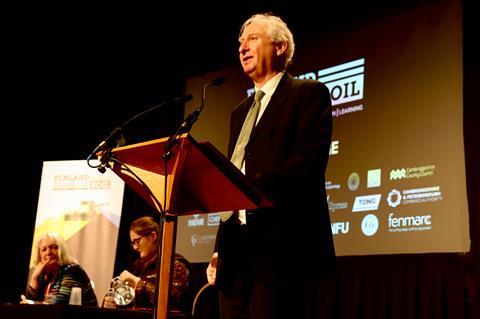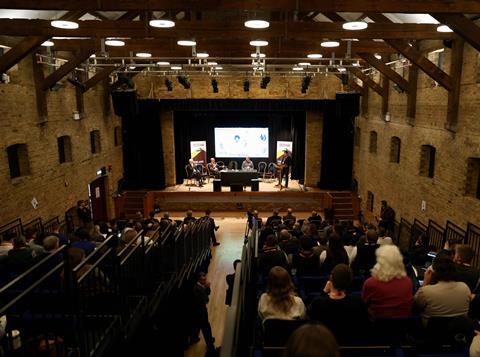Cambridgeshire climate-change farming-group discusses future of lowland agricultural peat at annual conference

Fenland SOIL – the not-for-profit members-organisation that aims to achieve climate change mitigation and biodiversity enhancement in the Fens – discussed the future of lowland agricultural peat at its annual conference last month.
Held on 28-29 January in Ely, the event attracted over 180 delegates – including farmers from the East Anglian Fens and other lowland peat production areas across the UK, as well as academics, environmental groups, local government officials, national retailers and Defra policymakers.
Defra minister Daniel Zeichner officially opened The Fenland SOIL Conference 2025, where he reinforced the government’s commitment to a new Land Use Framework and a fair transition for farmers to sustainable agricultural practices.
Climate, sustainability and regenerative farming
The two-day event featured discussions on future climate scenarios, including a presentation on the new Fens Climate Change Risk Assessment.
Attendees heard from the Fenland SOIL team, who shared project updates on landscape-scale systems thinking and mapping. And Countryfile presenter Tom Heap presented findings from his latest book, Land Smart, on how to give people and nature the space to thrive.
The first day concluded with a panel discussion on sustainable farming practices for lowland peat, which sparked debate on the future of agriculture in the region, according to the organisers.
The evening reception featured Henry Dimbleby MBE as keynote speaker. In addition, a fundraising raffle raised £561 for YANA (You Are Not Alone), a rural mental health charity.
Greenhouse gas emissions, peat management and water governance
Kicking off day-two, the Liberal Democrat MP for Ely and East Cambridgeshire Charlotte Cane addressed delegates virtually, emphasising the importance of a vibrant agricultural community for the economic success and future prosperity of the region.
Following her speech, the conference featured sessions on Greenhouse Gas (GHG) emissions, including a presentation by Brenda D’Acunha of UKCEH, who provided clarity on GHG monitoring at the field scale.
Later in the day, Rachel Hallos, NFU vice president, led a session on managing peat for wetter farming. And experts including Lucy Sly and Peter Sargeant shared their experiences from the Fenland SOIL Paludiculture Trial.
The afternoon focused on water governance and the economics of sustainable lowland peat management, with insights from Doug McMillan of Green Restoration Ireland and Sarah Taylor of Oxwillow.

Commenting on the event, Megan Hudson, general manager of Fenland SOIL, said: “Fenland SOIL continues to build momentum in bringing together a diverse range of stakeholders to address the challenges of lowland agricultural peat management.
“We were thrilled to share our progress and learnings over the past two years, and it was a pleasure to have such esteemed speakers and delegates in attendance. We are especially grateful for the support from Minister Zeichner, Henry Dimbleby, Tom Heap, and Rachel Hallos.”
Looking Ahead
Fenland SOIL is preparing to report on its Paludiculture Exploration Fund and Lowland Agricultural Peat Water Discovery Pilot projects, with findings expected in the spring.
The organisation will also be recruiting for new project rounds in the coming months.
Fenland SOIL is a not-for-profit members organisation that aims to inform and develop ‘whole farm’ land use policies, aimed at achieving climate change mitigation and biodiversity enhancement in the Fens, and to help establish an agreed set of numbers for GHG emissions for deep, shallow and wasted peat soils.
Fenland SOIL was set up in 2021 as part of the work carried out by the Cambridgeshire and Peterborough Combined Authority’s Independent Commission on Climate as a dedicated team with farmers at its core to tackle climate issues relating to agriculture and peat in the Fens.
The group is chaired by John Shropshire (G’s Fresh, CPICC commissioner) and operates across five workstreams each led by a champion, the Fenland Farmer’s Dialogue Group (Nick Allpress, Allpress Farms, LAPTF), Landscape Mapping (Ian Holman, Cranfield University), Nature Based Systems (Mike Maunder, University of Cambridge), Measuring GHG Emissions (Chris Evans, UKCEH), and Economics (Mat Smith, F Smith and Sons, NFU County Chairman).



